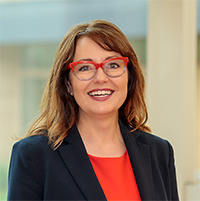In this Article
Accounting Education and Career Guide
Your Guide to Earning a Master's Degree in Accounting

A master's degree in accounting gives you in-depth knowledge of accounting practices, often within a specialty. It lays the groundwork to advance your career and is frequently used as preparation to become a certified public accountant (CPA).
Master's in Accounting
There are several accounting degrees. Some people start with an associate degree and work their way up to bachelor's and master's degrees.
Many options are available for master's degrees, including numerous programs that are offered part time and online. This allows working professionals to earn a graduate degree at a pace that's realistic for them. You'll also find options for different degree concentrations, enabling you to focus your studies in an area of particular interest.
Prerequisites for an MS in Accounting
You'll need a bachelor's degree from an accredited school to be accepted into a master's program. In addition, you may need prerequisite courses, which often include statistics, accounting principles, and pre-calculus. If your bachelor's degree is in accounting or another business field, you'll likely meet this prerequisite.
Most graduate programs expect applicants to have an overall GPA of 3.0, but some accept a 3.0 in relevant coursework.
You may also need to take the GMAT (Graduate Management Admission Test) as part of the acceptance process. Some schools may accept the GRE (Graduate Record Examination), but the GMAT is usually considered the standard for graduate-level business programs.
Most graduate programs expect applicants to have an overall GPA of 3.0, but some accept a 3.0 in relevant coursework.
Accounting MS Curriculum
Each master's program will have slightly different coursework, but most will cover:
Master's Concentrations
Master's programs often offer concentrations that prepare you for an accounting specialty. Some of these specializations are:
Thesis/Capstone Project
A thesis, capstone project, or internship is sometimes required to complete a master's degree in accounting. Some programs will allow students to use their work experience to satisfy internship requirements.
A master's thesis involves original research and is typically 60 to 100 pages. Capstone projects focus on applying what students have learned to solve an accounting-related problem and may include working with actual clients.
Program Length
Master's programs range from 30 to 36 credits, which will take a full-time student 12 to 18 months to earn. There are numerous options for part-time studies, some of which allow you to complete your degree at your own pace.
Many online programs offer accelerated programs as well, often eliminating semester breaks so you can finish sooner.
There are numerous options for part-time studies, some of which allow you to complete your degree at your own pace.
Why Pursue a Master's in Accounting?
Master's degrees are a popular choice for accountants who want deeper expertise in their field or to specialize as forensic accountants or certified management accountants (CMAs).
Someone with a master's degree may earn a higher salary and also have an easier time advancing to a more senior role, such as:
Many students pursue a master's degree as part of their studies to become a CPA. Requirements to become a CPA typically include 150 college credits, which is 30 more than most bachelor's degrees. A master's degree generally requires 30 to 45 credits, which are often used to fulfill CPA requirements.
A master's is truly a deep study of accounting and has a narrower curriculum compared to a master's in business administration with a focus on accounting, says Angel Chatterton, senior instructor of accountancy at the University of Illinois Urbana-Champaign. "If you want to do a more strategic leadership type of position, you go with an MBA," Chatterton says.
Advancing Your Education

A doctorate, or PhD, in accounting is the highest degree you can earn. If you're interested in teaching or conducting research at the university level, you will likely need a PhD.
Few outside academia will pursue a doctorate, however, so if that's not your aspiration, you may be interested in earning a specialty certification after your master's.
Certifications deepen your knowledge and can lead to more opportunities for senior accounting positions. Examples of in-demand certifications are:


